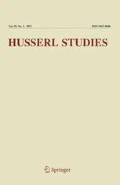Abstract
A fruitful way to approach The Idea of Phenomenology is through Husserl’s claim that consciousness is not a bag, box, or any other kind of container. The bag conception, which dominated much of modern philosophy, is rooted in the idea that philosophy is restricted to investigating only what is really immanent to consciousness, such as acts and sensory contents. On this view, what Husserl called “the riddle of transcendence” can never be solved. The phenomenological reduction, as Husserl develops it in The Idea of Phenomenology, opened up a new and broader sense of immanence that embraces the transcendent, making it possible both to solve the riddle and to escape the bag conception once and for all. The essay will discuss ways in which this new conception of immanence is tied to the key Husserlian themes of appearance, phenomenon, essence, seeing or intuiting, and constitution.
Similar content being viewed by others
Notes
As early as 1894, Husserl campaigned against a version of this position, the image theory, according to which “every presentation relates to its object by means of a ‘mental image” (Hua XXII, 305). In the Logical Investigations, he describes the image theory of perception as holding that “the thing itself is ‘outside’… : and the image is in consciousness as its representative,” and calls the view a “fundamental and almost ineradicable error” (Hua XIX/1, 436/593). This is certainly an implicit criticism of the container conception of consciousness. It is interesting to note, however, that while Husserl criticizes the application of the image theory to perception, he does not offer a developed view to replace it. Furthermore, he largely accepts the image theory with respect to phantasy and memory until about 1907, when he gave the lectures that make up The Idea of Phenomenology. Husserl’s decisive case against the bag conception and the image theory must await the appearance in the 1907 lectures of his mature account of the reduction, immanence, transcendence, and constitution, themes to be discussed in the next two sections of this essay.
It is certainly possible to argue that something like this form of the reduction is already implicitly at work in the Logical Investigations and in lectures and sketches written before 1907 (such as the lectures on time consciousness from 1905), in the sense that Husserl attempts in those texts to focus purely on acts of consciousness and their contents, all of which are reell moments of consciousness. As we shall see, the conception of the reduction that comes explicitly to the fore in The Idea of Phenomenology makes possible and explicitly sanctions not only the investigation of the reell components of consciousness, but of transcendent intentional objects as well. It opens the door to a firmly grounded and far richer conception of phenomenology, one that has shed the vagueness and confusion that haunted phenomenology’s first steps.
References
Descartes, R. (1986). Meditations on First Philosophy. (J. Cottingham, Trans.). Cambridge: Cambridge University Press.
Gurwitsch, A. (1964). The field of consciousness. Pittsburgh: Duquesne University Press.
Husserl, E. (1958). Die Idee der Phänomenologie. Husserliana II. W. Biemel (Ed.). (2nd ed.) Martinus Nijhoff: The Hague. English translation: The idea of phenomenology. Edmund Husserl: Collected Works, Vol VIII. (L. Hardy, Trans.). Dordrecht: Kluwer Academic Publishers, 1990. Page references to the Husserliana edition will precede references to the English translation.
Husserl, E. (1962). Die Krisis der Europäischen Wissenschaften und die Transzendentale Phänomenologie. Husserliana VI. R. Boehm (Ed.). (2nd ed.). Martinus Nijhoff: The Hague. English Translation: The Crisis of European Sciences and Transcendental Phenomenology. (D. Carr, Trans.). Evanston: Northwestern University Press, 1970.
Husserl, E. (1966). Zur Phänomenologie des inneren Zeitbewusstseins (1893–1917). Husserliana X, R. Boehm (Ed.). Martinus Nijhoff: The Hague. English translation: On the phenomenology of the consciousness of internal time (1893–1917). Edmund Husserl: Collected Works, Vol. IV. (J. Brough, Trans.). Dordrecht: Kluwer Academic Publishers, 1991.
Husserl, E. (1975). Logische Untersuchungen. Erste Band. Husserliana XVIII. E. Holenstein (Ed.). Martinus Nijhoff: The Hague. English translation: Logical Investigations. (J. N. Findlay, Trans.). 2 vols. London: Routledge and Kegan Paul, 1970.
Husserl, E. (1984). Logische Untersuchungen. Untersuchungen zur Phänomenologie und Theorie der Erkenntnis. Husserliana XIX/1. U. Panzer (Ed.). Martinus Nijhoff: The Hague. English translation: Logical Investigations. (J. N. Findlay, Trans.). 2 vols. London: Routledge and Kegan Paul, 1970.
Husserl, E. (1979). Aufsätze und Rezensionen (1890–1910). Husserliana XXII. B. Rang (Ed.). The Hague: Martinus Nijhoff.
Husserl, E. (1980). Phantasie, Bildbewusstsein, Erinnerung (1895–1925). Husserliana XXIII. E. Marbach (Ed.). Martinus Nijhoff: The Hague. English translation: Phantasy, Image Consciousness, and Memory (1898–1925). Edmund Husserl: Collected Works, Volume XI. (J. Brough, Trans.). Dordrecht: Springer, 2005.
Locke, J. (1924). An Essay Concerning Human Understanding, A. S. Pringle-Pattison (Ed.). Oxford: Oxford University Press.
Wittgenstein, L. (1953). Philosophical Investigations. G. E. M. Anscombe (Trans.). New York: The MacMillan Company.
Author information
Authors and Affiliations
Corresponding author
Rights and permissions
About this article
Cite this article
Brough, J.B. Consciousness is not a Bag: Immanence, Transcendence, and Constitution in The Idea of Phenomenology . Husserl Stud 24, 177–191 (2008). https://doi.org/10.1007/s10743-008-9045-3
Accepted:
Published:
Issue Date:
DOI: https://doi.org/10.1007/s10743-008-9045-3




